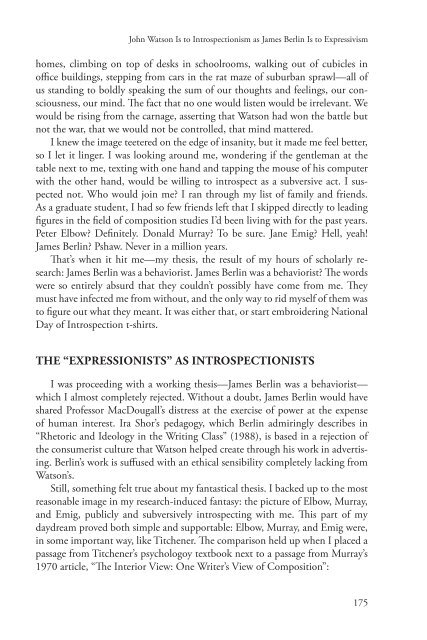Critical Expressivism- Theory and Practice in the Composition Classroom, 2014a
Critical Expressivism- Theory and Practice in the Composition Classroom, 2014a
Critical Expressivism- Theory and Practice in the Composition Classroom, 2014a
You also want an ePaper? Increase the reach of your titles
YUMPU automatically turns print PDFs into web optimized ePapers that Google loves.
John Watson Is to Introspectionism as James Berl<strong>in</strong> Is to <strong>Expressivism</strong><br />
homes, climb<strong>in</strong>g on top of desks <strong>in</strong> schoolrooms, walk<strong>in</strong>g out of cubicles <strong>in</strong><br />
office build<strong>in</strong>gs, stepp<strong>in</strong>g from cars <strong>in</strong> <strong>the</strong> rat maze of suburban sprawl—all of<br />
us st<strong>and</strong><strong>in</strong>g to boldly speak<strong>in</strong>g <strong>the</strong> sum of our thoughts <strong>and</strong> feel<strong>in</strong>gs, our consciousness,<br />
our m<strong>in</strong>d. The fact that no one would listen would be irrelevant. We<br />
would be ris<strong>in</strong>g from <strong>the</strong> carnage, assert<strong>in</strong>g that Watson had won <strong>the</strong> battle but<br />
not <strong>the</strong> war, that we would not be controlled, that m<strong>in</strong>d mattered.<br />
I knew <strong>the</strong> image teetered on <strong>the</strong> edge of <strong>in</strong>sanity, but it made me feel better,<br />
so I let it l<strong>in</strong>ger. I was look<strong>in</strong>g around me, wonder<strong>in</strong>g if <strong>the</strong> gentleman at <strong>the</strong><br />
table next to me, text<strong>in</strong>g with one h<strong>and</strong> <strong>and</strong> tapp<strong>in</strong>g <strong>the</strong> mouse of his computer<br />
with <strong>the</strong> o<strong>the</strong>r h<strong>and</strong>, would be will<strong>in</strong>g to <strong>in</strong>trospect as a subversive act. I suspected<br />
not. Who would jo<strong>in</strong> me? I ran through my list of family <strong>and</strong> friends.<br />
As a graduate student, I had so few friends left that I skipped directly to lead<strong>in</strong>g<br />
figures <strong>in</strong> <strong>the</strong> field of composition studies I’d been liv<strong>in</strong>g with for <strong>the</strong> past years.<br />
Peter Elbow? Def<strong>in</strong>itely. Donald Murray? To be sure. Jane Emig? Hell, yeah!<br />
James Berl<strong>in</strong>? Pshaw. Never <strong>in</strong> a million years.<br />
That’s when it hit me—my <strong>the</strong>sis, <strong>the</strong> result of my hours of scholarly research:<br />
James Berl<strong>in</strong> was a behaviorist. James Berl<strong>in</strong> was a behaviorist? The words<br />
were so entirely absurd that <strong>the</strong>y couldn’t possibly have come from me. They<br />
must have <strong>in</strong>fected me from without, <strong>and</strong> <strong>the</strong> only way to rid myself of <strong>the</strong>m was<br />
to figure out what <strong>the</strong>y meant. It was ei<strong>the</strong>r that, or start embroider<strong>in</strong>g National<br />
Day of Introspection t-shirts.<br />
THE “EXPRESSIONISTS” AS INTROSPECTIONISTS<br />
I was proceed<strong>in</strong>g with a work<strong>in</strong>g <strong>the</strong>sis—James Berl<strong>in</strong> was a behaviorist—<br />
which I almost completely rejected. Without a doubt, James Berl<strong>in</strong> would have<br />
shared Professor MacDougall’s distress at <strong>the</strong> exercise of power at <strong>the</strong> expense<br />
of human <strong>in</strong>terest. Ira Shor’s pedagogy, which Berl<strong>in</strong> admir<strong>in</strong>gly describes <strong>in</strong><br />
“Rhetoric <strong>and</strong> Ideology <strong>in</strong> <strong>the</strong> Writ<strong>in</strong>g Class” (1988), is based <strong>in</strong> a rejection of<br />
<strong>the</strong> consumerist culture that Watson helped create through his work <strong>in</strong> advertis<strong>in</strong>g.<br />
Berl<strong>in</strong>’s work is suffused with an ethical sensibility completely lack<strong>in</strong>g from<br />
Watson’s.<br />
Still, someth<strong>in</strong>g felt true about my fantastical <strong>the</strong>sis. I backed up to <strong>the</strong> most<br />
reasonable image <strong>in</strong> my research-<strong>in</strong>duced fantasy: <strong>the</strong> picture of Elbow, Murray,<br />
<strong>and</strong> Emig, publicly <strong>and</strong> subversively <strong>in</strong>trospect<strong>in</strong>g with me. This part of my<br />
daydream proved both simple <strong>and</strong> supportable: Elbow, Murray, <strong>and</strong> Emig were,<br />
<strong>in</strong> some important way, like Titchener. The comparison held up when I placed a<br />
passage from Titchener’s psychologoy textbook next to a passage from Murray’s<br />
1970 article, “The Interior View: One Writer’s View of <strong>Composition</strong>”:<br />
175


















